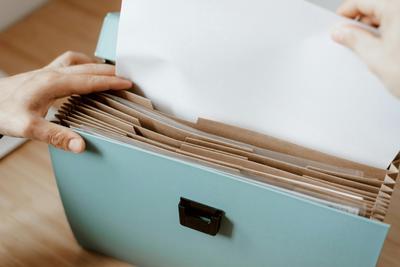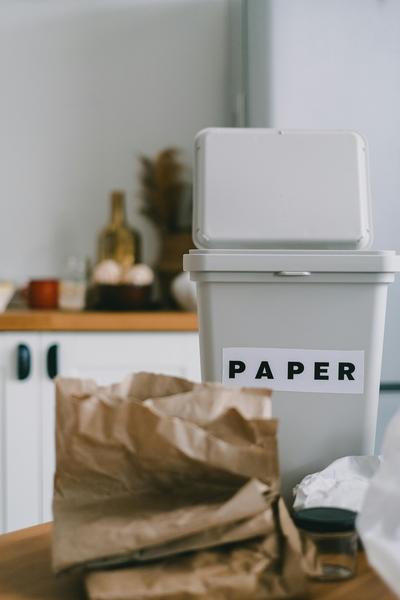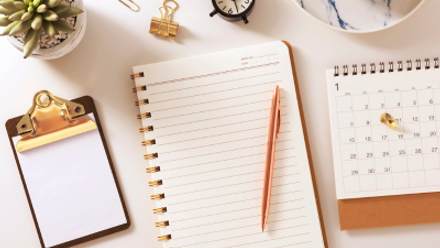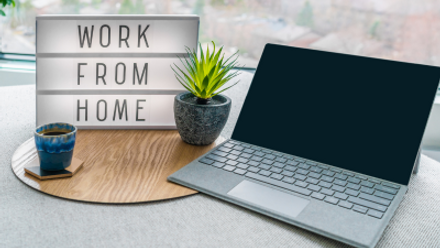All you need to know about going paperless at home
4 minute read
In 2020, the UK consumed nearly 10 million tons of paper and board.

To help visualise this massive statistic, a fully grown Oak tree weighs about 1 ton. Now try to imagine 10 million Oak trees. That's a colossal amount of paper consumed in the UK in just 1 year!
Reducing our paper consumption is as important now as it's ever been. Not only does less consumption reduce the number of trees being cut down, but it also minimises the amount of energy used to convert trees into paper and slashes the volume of waste we produce.
But how can our personal journey towards a paperless home or work space impact such a huge national statistic?
There are 3 courses of action we can take:
1. Increase our digital storage capacity;
2. Take control of the paper that comes into our homes and
3. Improve our recycling habits.
The following 5 steps will help you reduce your personal paper consumption:
1. Review your document management system

Take a moment to consider the paper in your home. Ask yourself, where and how is my paper stored? How much do I have and what is it? Where does it originate from? What am I keeping it for?
It can be a surprise when you pause and notice what is around you. Conducting a mini review like this will help you identify what's working and what's not, leading you to think more intentionally about your paper use.
Whether you're ready to overhaul or tweak your existing paper system, or discover you need to implement one from scratch, consider photographing your important papers and storing them digitally in the cloud via services such as One Drive and Google Drive. Smart phone cameras take excellent quality images which can be shared and stored electronically, creating an appropriate alternative to using a scanner. Receipts can be managed digitally using apps such as Expensify and Smart Receipts.
Remember to also take control of the paper that comes into your home by opting out of junk mail through The Mailing Preference Service and adding a simple sticker to your door indicating your preferences.
2. Switch to online billing, statements and receipts
If you haven't already tackled this, it's a great place to start. Most, if not all financial institutions now offer paperless banking and this could quickly eliminate any monthly paper statements you might still be receiving. Your energy providers are likely to do the same, as will many other organisations such as shopping outlets and pension schemes. Contact your providers to find out how to switch to digital alternatives and instantly reduce your post and paper storage.
3. Use an online note taker or task manager
If you write paper notes or collect notebooks full of lists and reminders, it may be time to consider a digital alternative. There are a vast range of apps to choose from such as Wunderlist and Trello. You may need to try a few before you find one that works for you, but as well as reducing your reliance on paper, you'll potentially discover other useful features to make managing your life and schedule simpler.
4. Add recycling bins and a shredder

If the thought of going digital has your head in a spin, then the most effective place to start might be to position recycling bins around your home to make recycling quick and easy. Put them where paper collects such as by the front door. I even have little bins in my bathroom to catch empty toilet rolls, toothpaste boxes and packaging.
Using a shredder allows you to dispose quickly of any sensitive or personal papers and can help prevent paper piles. Some local authorities now accept shredded paper from the kerbside but check in your area for the appropriate option. If you're not ready for this investment, how about using a marker pen or Identity theft roller to give you the confidence to dispose of your unwanted papers?
5. Edit your subscriptions and reading habit
Switching to an electronic newspaper or magazine in place of a hard copy version is certainly worth investigating. Cancelling or amending any hard copy subscriptions will save you money and paper. Using an electronic reader or software will minimise your physical book collection and engaging with an app like Goodreads or Bookly will help you catalogue your books and share recommendations with friends.
Ultimately, reducing our personal paper consumption requires action. Picking one of these steps could be a great launch pad for you and your household. You'll not only be contributing towards a global effort to reduce paper consumption, but you'll see personal benefits too. Reduced time spent looking for documents hidden amongst paper clutter, increased confidence in finding your important papers when you need them and an improved living and working environment.
If you'd like to get started with your paperwork but need a little help, a Professional Organiser can provide support, encouragement and direction. Take a look at our Find an Organiser page to find your local organiser today.
Lynda Wylie founded Tidy Rooms in 2012 and loves working alongside clients to support them with decisions about their homes and work spaces. She lives in Surrey with her husband, cat Bonnie and 2 sons who are now taller than she is.






